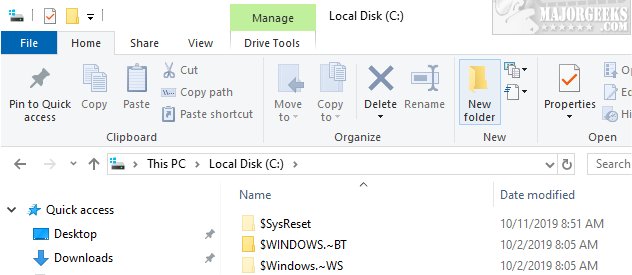What Is the $Windows.~BT Folder and Can I Delete It?
By Timothy Tibbettson 07/18/2023 |
The $WINDOWS.~BT is a hidden folder created by a Windows Upgrade, typically done with Windows Updates. Other folders may appear including $GetCurrent, $WINDOWS.~BT, and $SysReset. The folders are hidden, and you can check for them by clicking View > Hidden items in File Explorer.
While you can delete the $Windows.~Bt, it's easier to ignore unless it's using a lot of space. We've seen the $Windows.~Bt folder take under 1MB but also use over 6GB.

Verify you don't have any Windows Updates pending by clicking Start > Settings > Update & Security > Check for Updates. We'd also wait a few days to a week to see if there's a large feature update coming.
Now that we've let you know that you don't need to delete these folders let's delete them anyway.
Open PowerShell and type the following lines one at a time pressing Enter after each line:
takeown /F C:$Windows.~BT* /R /A
icacls C:$Windows.~BT*.* /T /grant administrators:F
rmdir /S /Q C:$Windows.~BT

Another option would be to use a batch file. Copy and paste the following lines into Notepad and save as Delete Windows_WS and Windows_BT.bat. Double-click Delete Windows_WS and Windows_BT.bat to delete the folders. Do not run the batch file as an administrator.
@echo off
@echo "This will delete the folder C:$Windows.~WS and C:$Windows.~BT. Windows 10 only."
@echo --------------------------------
@echo If you get the message "The system cannot find the file specified" it means the folder is already deleted.
@echo --------------------------------
PAUSE
RD /S /Q "C:$Windows.~WS"
RD /S /Q "C:$Windows.~BT"
@echo --------------------------------
@echo All done
@echo --------------------------------
PAUSE NULL
You can also download the batch file from MajorGeeks if you're not familiar with batch files.
Similar:
What Is the $SysReset Folder and Can I Delete It in Windows 10?
What Are the $GetCurrent and $WINDOWS.~BT Folders and How to Delete Them
Will Windows 10 Receive Windows Updates if It's Not Activated?
How-To Delete Pending Windows Updates
How to Block or Defer Windows 10 Major Updates
How to Uninstall Windows 10 Updates
Configure When and How Windows Updates Are Delivered
How-to Change Rollback Days for Windows 10 Feature Upgrades
comments powered by Disqus
While you can delete the $Windows.~Bt, it's easier to ignore unless it's using a lot of space. We've seen the $Windows.~Bt folder take under 1MB but also use over 6GB.

Verify you don't have any Windows Updates pending by clicking Start > Settings > Update & Security > Check for Updates. We'd also wait a few days to a week to see if there's a large feature update coming.
Now that we've let you know that you don't need to delete these folders let's delete them anyway.
Open PowerShell and type the following lines one at a time pressing Enter after each line:
takeown /F C:$Windows.~BT* /R /A
icacls C:$Windows.~BT*.* /T /grant administrators:F
rmdir /S /Q C:$Windows.~BT

Another option would be to use a batch file. Copy and paste the following lines into Notepad and save as Delete Windows_WS and Windows_BT.bat. Double-click Delete Windows_WS and Windows_BT.bat to delete the folders. Do not run the batch file as an administrator.
@echo off
@echo "This will delete the folder C:$Windows.~WS and C:$Windows.~BT. Windows 10 only."
@echo --------------------------------
@echo If you get the message "The system cannot find the file specified" it means the folder is already deleted.
@echo --------------------------------
PAUSE
RD /S /Q "C:$Windows.~WS"
RD /S /Q "C:$Windows.~BT"
@echo --------------------------------
@echo All done
@echo --------------------------------
PAUSE NULL
You can also download the batch file from MajorGeeks if you're not familiar with batch files.
Similar:
What Is the $SysReset Folder and Can I Delete It in Windows 10?
What Are the $GetCurrent and $WINDOWS.~BT Folders and How to Delete Them
Will Windows 10 Receive Windows Updates if It's Not Activated?
How-To Delete Pending Windows Updates
How to Block or Defer Windows 10 Major Updates
How to Uninstall Windows 10 Updates
Configure When and How Windows Updates Are Delivered
How-to Change Rollback Days for Windows 10 Feature Upgrades
comments powered by Disqus






